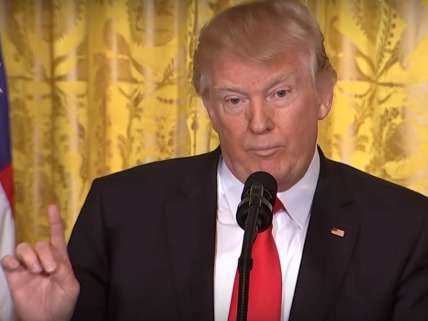Trump Wants to 'Change Libel Laws' So That Truth Is No Defense
The president thinks incomplete press coverage should be grounds for a lawsuit.

Yesterday on Twitter, President Trump complained about The New York Times (which he had previously identified as an "enemy of the American People") and suggested that its coverage could be improved by making it easier for public figures like him to file successful defamation lawsuits: "The failing @nytimes has disgraced the media world. Gotten me wrong for two solid years. Change libel laws?" The tweet recalled comments Trump made during his presidential campaign last year, when he said, "I'm going to open up our libel laws" so that "when The New York Times writes a hit piece which is a total disgrace or when The Washington Post…writes a hit piece, we can sue them and win money instead of having no chance of winning because they're totally protected."
As New York Times legal writer Adam Liptak points out (not for the first time), the president actually has no power to "open up our libel laws," since libel "is a state-law tort, meaning that state courts and state legislatures have defined its contours." Furthermore, the Supreme Court has said the First Amendment limits the ability of politicians and other public figures to recover damages when a journalist makes them look bad: They have to show not only that a reputation-damaging story was false but that the author knew, or at least suspected, it was false. That "actual malice" standard has been the law for more than half a century, since the Court decided New York Times v. Sullivan. "Changing New York Times v. Sullivan would require either the Supreme Court to overrule it or a constitutional amendment," Liptak writes. "Neither is remotely likely."
Yesterday's tweet shows that Trump's misunderstanding of libel law goes beyond his ignorance of how it is made and how it is constrained by the First Amendment. His tweet links to a piece in which New York Post columnist John Crudele criticizes the Times for omitting relevant information from its coverage of Trump's widely derided claim that "President Obama was tapping my phones in October." Crudele notes that the Times reported last January, under the print headline "Wiretapped Data Used in Inquiry of Trump Aides," that "American law enforcement and intelligence agencies are examining intercepted communications and financial transactions as part of a broad investigation into possible links between Russian officials and associates of President-elect Donald J. Trump." Trump says that article confirms his claim about Obama. It doesn't, as Crudele concedes. But he argues that the story "does make Trump's accusation look a little less crazy" and should have been mentioned in coverage of the controversy about Obama's alleged wiretapping of Trump Tower.
Even if you think Crudele has a point, there is nothing remotely libelous about the articles he is criticizing. They may be incomplete, but they are not defamatory, because they are not false. As evidence of the need to "change libel laws," Trump cites unfavorable press coverage that is accurate but arguably lacks context. Even if New York Times v. Sullivan had never happened, such a complaint would not justify a libel claim, which has to assert that the defendant said something that was verifiably false. Without that threshold requirement, journalism would be financially untenable, because disagreements about its quality would be resolved through litigation instead of criticism and public debate.
Trump does not seem to grasp that journalism can be not just negative but unfair, unbalanced, or misleading without being libelous (which helps explain why he threatens to sue people at the drop of a hat). When he complains that the Times has "gotten me wrong for two solid years," he may mean that the paper underestimated him, that it consistently portrayed him in a negative light, or that he did not recognize himself in its coverage. None of that is grounds for a lawsuit, and anyone who values freedom of speech should be thankful for that fact.


Show Comments (21)